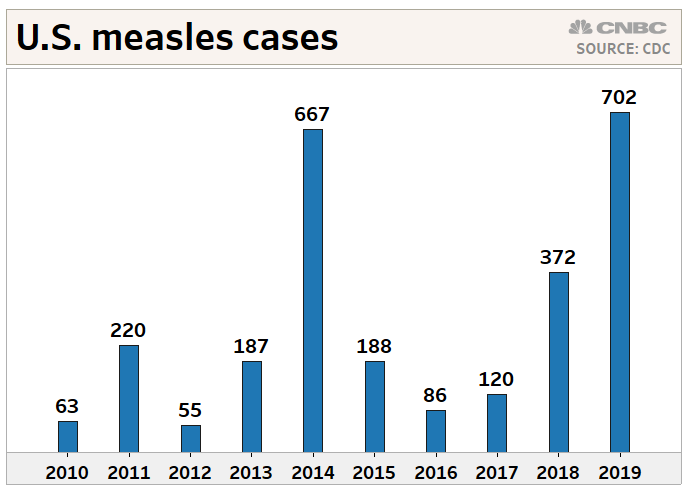In this photo illustration a 10 pack and one dose bottles of measles, mumps and rubella virus vaccine, made by MERCK, sits on a counter at the Salt Lake County Health Department on April 26, 2019 in Salt Lake City, Utah.
George Frey | Getty Images
U.S. health officials confirmed another 78 cases of measles last week, urging people to vaccinate as they battle the worst year for the disease in 25 years.
The Centers for Disease Control and Prevention on Monday said it has confirmed 704 cases of measles as of Friday, the largest number of cases in the U.S. in a single year since 1994 and the largest number of cases since the measles was considered eliminated from the U.S. in 2000.
Cases have been reported in 22 states this year. Most of the new cases were reported in New York, where outbreaks are occurring in New York City and Rockland County.
Nearly three-quarters of this year's measles cases were in unvaccinated people, the CDC said. The measles, mumps and rubella shot is the best way to prevent the disease, which is one of the most contagious in the world. Measles infects 90% of unvaccinated people who are exposed to it, according to the CDC.
"Vaccine-preventable diseases belong in the history books, not our emergency rooms," Health and Human Services Secretary Alex Azar told reporters on a media call Monday. "Vaccination is a simple, safe and effective way to protect our loved ones and neighbors from the scourge of measles, and the suffering we're seeing today is completely avoidable."

Six of the 13 outbreaks were associated with close-knit religious or cultural communities with lower immunization rates, the CDC said. Yet they accounted for 88% of all cases this year, highlighting how easily the disease can spread among people who are not vaccinated.
New York City health officials earlier this month mandated people get a measles, mumps and rubella shot or else be fined. They also closed one Jewish school that allegedly would not provide immunization records as the city tries to vaccinate people in the ultra-Orthodox Jewish community, which outside groups have targeted with misinformation about vaccines.
Two Los Angeles universities last week quarantined more than 700 students who may have been exposed to the measles after an outbreak was declared in the county.
"Really, this should be a wake up call," said Amesh Adalja, an infectious disease doctor at Johns Hopkins University. "We're dealing with a disease that should have been taken off the table in the 1960s, and now in 2019, when we're planning a mission to Mars, we're dealing with it because we're allowing it to be here."
For more on investing in health care innovation, click here to join CNBC at our Healthy Returns Summit in New York City on May 21.
Before the measles vaccine became available in 1963, nearly all children got the disease before the turned 15, the CDC said. Every year, an estimated 400 to 500 people died, 48,000 were hospitalized and 1,000 experienced brain swelling that can occur in people infected with measles.
Measles is still common in other parts of the world. Fourty-four of U.S. cases this year were directly imported from other countries, including the Philippines, Ukraine and Israel, the CDC said. Nearly all of the people who became ill were not vaccinated.
Receiving both recommended doses of the measles, mumps and rubella (MMR) vaccine is 97% effective in preventing the measles, according to the CDC. Health officials declared the disease eliminated from the U.S. in 2000, thanks to vaccination efforts.
However, more parents are refusing some parents refuse to vaccinate their children. Reasons vary, but some point to false information that vaccines cause autism. President Donald Trump has peddled this misinformation in the past, though last week he reversed course, saying people "have to get the shots."
The longer the current outbreaks in the country continue, the greater the chance that measles will "again get a sustained foothold" in the U.S., the CDC said. Outbreaks are defined as three or more cases.
via IFTTT
No comments:
Post a Comment